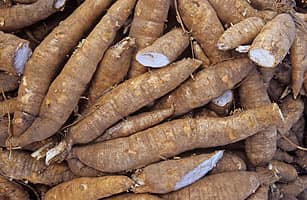There are no products in your shopping cart.
| 0 Items | £0.00 |


By Ayo Akinfe
(1) Not many people know that Nigeria is one of the world’s biggest agricultural producers. We are the world’s sixth largest farm produce producer. Unfortunately, this is not reflected in our economy because one third of all Nigerian farm produce goes to waste as a result of poor storage, transportation and refrigiration facilities
(2) How many people know for instance that Nigeria is the world’s largest cassava producer, accounting for about 20% of global output? Apparently, we produce 52m tonnes annually and generate $5bn in export earnings from the product.
(3) Now, what is most depressing is that Thailand, the workers number two producer with an output of just 30m tonnes generates more foreign exchange from cassava than Nigeria. Thailand has supply deals with several European animal feed compounders
(4) Thailand, Indonesia and Brazil all have well organised cassava industries that process the crop and package it for export as an animal feed additive. That is where the money is. They call theirs tapioca pellets and sell a well-packaged finished product
(5) Nigeria desperately needs to tap into this lucrative market as cassava is a good alternative to dangerous additives like meat and bone meal. Maybe we should have a dedicated cassava agency that just focuses on this crop. It should have an export revenue target that matches crude oil sales
(6) Cassava can be grown in virtually every one of Nigeria’s 36 states. It needs very little water and requires very little tending. I think the agriculture ministry should set production targets for each state
(7) Most of our staple foods in Nigeria like gari, fufu, lafun, akpu, etc are made from cassava, so with a population of 180m, we need to ringfence domestic consumption. What I would do is have a target of 40m tonnes for domestic use and then 60m tonnes for export to the global animal feed market
(8) One thing the Fulani herdsmen crisis has brought home is the desperate need for local animal feed compounders. If we set aside say 10m tonnes of cassava for livestock feed annually, no herdsman would be going into anybody’s farm. Feed these livestock on cassava-based compounds in dedicated ranches and watch the cattle fatten up
(9) Apart from animal feed and staple foods, cassava can be used for all sorts of other things including ethanol production. If we want to be really innovative and audacious, we will actually build a cassava-fired power plant
(10) Cassava is more abundant in Nigeria than crude oil, employs more people and subsequently should contribute more to our GDP, foreign exchange earnings and government revenue. This another untapped gold mine we are sitting on.
Ayo Akinfe